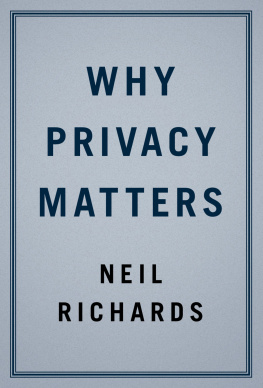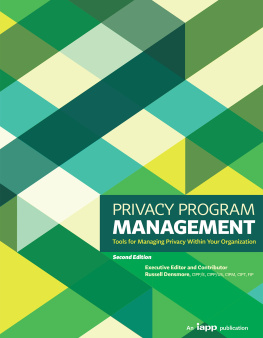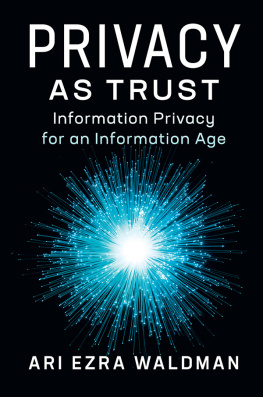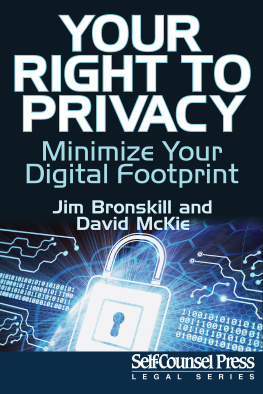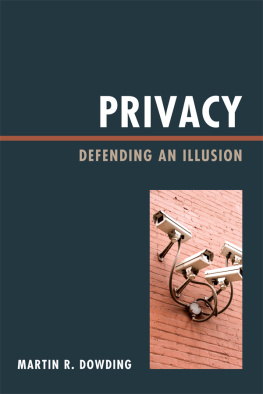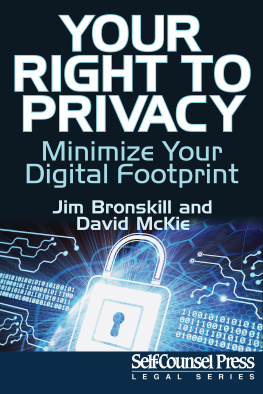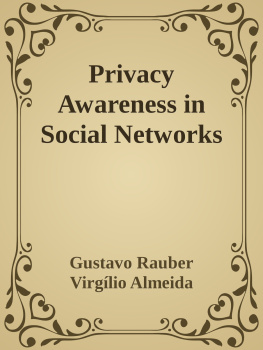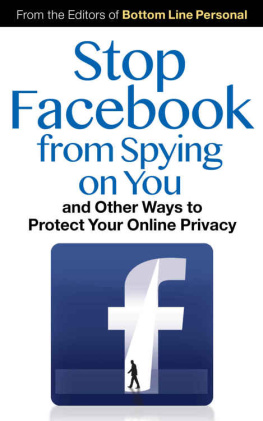Why Privacy Matters

Oxford University Press is a department of the University of Oxford. It furthers the Universitys objective of excellence in research, scholarship, and education by publishing worldwide. Oxford is a registered trade mark of Oxford University Press in the UK and certain other countries.
Published in the United States of America by Oxford University Press
198 Madison Avenue, New York, NY 10016, United States of America.
Oxford University Press 2022
All rights reserved. No part of this publication may be reproduced, stored in a retrieval system, or transmitted, in any form or by any means, without the prior permission in writing of Oxford University Press, or as expressly permitted by law, by license, or under terms agreed with the appropriate reproduction rights organization. Inquiries concerning reproduction outside the scope of the above should be sent to the Rights Department, Oxford University Press, at the address above.
You must not circulate this work in any other form and you must impose this same condition on any acquirer.
CIP data is on file at the Library of Congress
ISBN 9780190939045
eISBN 9780190939069
DOI: 10.1093/oso/9780190939045.001.0001
For Fiona and Declan
Contents
Privacy is dead. There should be no doubt whatsoever about that. We live in a society that constantly generates vast quantities of human informationinformation about you, me, and everyone we know. This information is in turn tracked, screened, and sorted by corporations and governments and shared exponentially to others. Ad networks monitor our web-surfing to send us more relevant ads. The National Security Agency screens our email activity for signs of radicalism. Schools track student sleep and activity patterns; CCTV cameras watch every street corner and traffic light; and drones have appeared in our skies. Vast databases of human information are assembled for purposes of training artificial intelligence programs designed to predict everything from traffic patterns and virus contagion to the location of undocumented migrants. We spy on the activities of loved ones, whether though Find My Friends or by tracking everything they do and say with their cell phones. Were even tracking ourselves, using personal electronics like Apple watches, Fitbits, and other gadgets that have made the quantified self a realistic possibility.
Privacys death has fittingly been a public one. Commentators and scholars have bemoaned the Death of Privacy at length. One 2017 New York Times article suggested that massive data breaches like the one suffered by credit broker Equifax signal the end of privacy. To repeat: privacy is dead, or at a minimum, it is dying.
Thats the conventional wisdom, anyway. Its something I hear a lot. In fact, its part of a conversation Ive had so many times that Ive started calling it just The Privacy Conversation. Ive had The Privacy Conversation with my colleagues and students, with taxi drivers and waiters, with barbers and bartenders. Ive had it with family and friends, and Ive had it with people Ive met in line at airports and baseball stadiums while we waited to go through privacy-invasive metal detectors. I have The Privacy Conversation about once a week, and it goes something like this.
Ill be chatting with someoneusually someone Ive just metand theyll ask me what I do. Im a law professor, I explain, and then theyll ask what kind of law I teach. Before the words privacy law even pass my lips, I know whats coming. Theres going to be a pause, and theyre going to say one of two things. Sometimes theyll jokingly say something like Well, you must be very busy then! But other times, the more interesting times, something else happens. Theyll say something like Well, there is no privacy anymore, is there? And then theres another pause and a funny noise. It sounds a bit like a cough and a bit like a laugh, but its more of a sad sound than a happy sound. Its a wistful sound, as if they are lamenting the Death of Privacy, lamenting the end of something they hardly appreciated before it was gone.
Then its my turn to talk. (Though its hard for a law professor, I try to be brief.) I explain that Privacy Is Dead is a myth, and a self-serving one at that, put forth by companies and governments that have lots to gain if our belief in privacy is lost. The Privacy Is Dead idea is false on its own terms. Our technologies collect lots of personal information, but lots of things are still private. We still wear clothes to cover our naked bodies; we still lock the doors to our homes (and our bedrooms and our bathrooms); we still keep secrets; and we still care about privacy. Besides, its just not the case that all digital information is known to everyone. We might talk about our information being out there, but most information exists in the vast intermediate spaces between being wholly private and wholly public.
More important, this Privacy Is Dead talk masks the real interests at stake: control of our digital society. We live in a society in which information is power, and privacy is the word we use to talk about the struggles over personal information, personal power, and personal control. If we think of it this way, privacy is very much alivebut very much hanging in the balance. We use privacy talk to try to come to grips with the tremendous changes in our society wrought by technologies running on human information, as well as our own places in that society. The rules for the collection and use of our information arent settled yet. But ordinary people are disempowered. Most of us lack sufficient knowledge about the technologies and the dense privacy policies and similar legal agreements that control ever more important parts of our lives. And even if we knew more, most of us would still lack the power or technical skills to do anything about it. Thats why many of us feel that our privacyour ability to have a say over our human informationis slipping away, running through our fingers like so many fine grains of sand.
At the same time, the flow of our human information has become one of the most important building blocks of our increasingly digital society. Its become a clich in the technology community to call personal datayour datathe new oil. From this perspective, human information is the fuel of the information economy: just as the Industrial Ages engines (cars, planes, and factories) ran on oil, so too do the Information Ages engines (social networks, GPS navigation software, and ad-targeting algorithms) run on data. It follows, insist the new oil evangelists, that access to human information is as essential to our information economy as access to oil was to our industrial economy. From this perspective, the processing of human information is inevitable, and privacy is just another old-fashioned, outdated concept that stands in the way of Progress.
I disagree: privacy isnt dead, nor should it be. But privacy is up for grabs. Our conversations about privacy are just the lively battleground over this new oil of personal information. They are fights over social power because information is power, and in any society, information about the people in it confers social power.
Viewed from this perspective, privacy matters. How we talk about privacy matters. And how we think about privacy matters. Privacy is about more than just keeping human information unknown or unknowable. Its certainly more than the ability of individuals to control access to that information. Put simply, privacy is about power. Privacy is about the rules governing the extent to which human information is detected, collected, used, shared, and stored and how those activities can be used to affect our lives. Its not just about who knows what about us, but about what rules apply to what they know. Thus, a secret is still a secret once it is shared with a confidant, and we still continue to care about what we share. Similarly, our data can remain private even when we share it with companies. After all, their privacy policies detail not just what information is collected about us but what the company will (and wont) do with that information. In an age of data, privacy rules are the rules that govern the flows of human informationthe information about our beliefs, our aspirations, and every moment of our lives.

